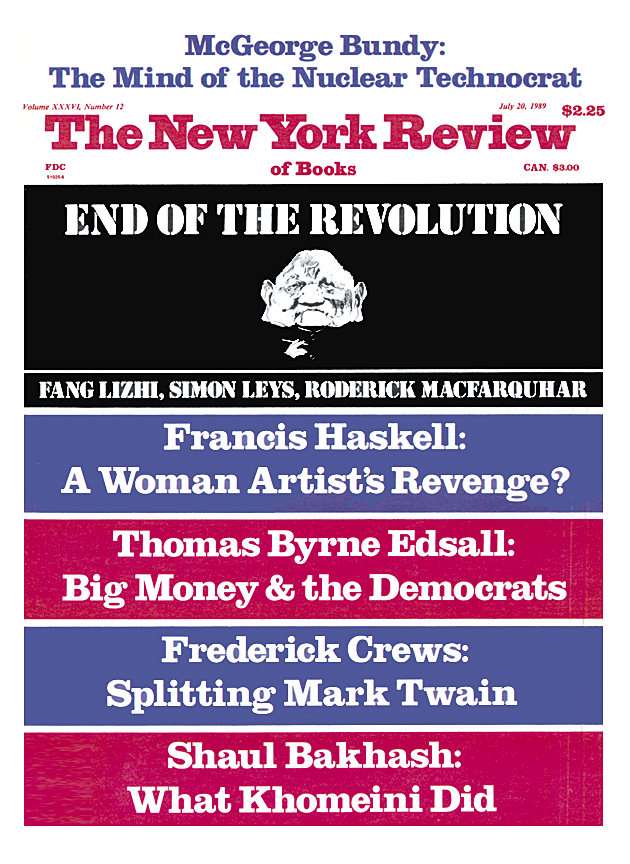In response to:
Czech Mates from the May 18, 1989 issue
To the Editors:
The New York Review of Books has a praiseworthy policy of frequently grouping a number of works in a sort of “omnibus” review, and Mr. D.J. Enright’s review of four Czech novels [NYR, May 18] is a case in point. The purpose of this device would seem to be not merely to tote up a number of books, but to bring out some sort of generalizations (or contrasts) among them. Mr. Enright had an opportunity to tell us something about contemporary Czech literature. But he did not. Indeed, his only generalization concerning the four novels he reviewed is that the word “paradise” in Czech implies sexuality. But it originally did so in the Book of Genesis. Why shouldn’t Eastern Europeans, burdened with a decrepit socialism, go in for sex in their spare moments?
If Mr. Enright were a specialist on modern Czech literature, he might have told us other things worth knowing, for instance, that Hrabal’s protagonist Ditie is a “child” (Czech díte). Perhaps Mr. Enright does not realize that Páral’s silence concerning his hero Jacek’s sexual activities is occasioned by a taboo on graphic sexual descriptions. This is not Páral’s fault, of course, or even Marx’s, but the fault of the same decrepit East European socialism. It is true, of course, that Hrabal’s novel I Served the King of England is much more graphic in its sexual details, but that novel was originally published in samizdat, and the present American version depends for its text on that edition. The Czech “original” which will be published shortly will, I predict, be rather less vivid in its sexual detail.
Mr. Enright’s favorite critical technique (at least, in the present review) is paraphrase of the original. Only with Páral’s Catapult does he bring up the big guns of a higher criticism. But what was it that so irritated him with Páral’s novel, for which Czech readers sacrificed so many hours standing in line (see the illustration to the review)? His main objection seems to be that Jacek is not a very likeable hero. I wonder what he thinks of the heroes of Céline, or even Hemingway?
Mr. Enright says almost nothing about the quality of translation of these four novels, but then it is hardly customary in American book reviews. To judge a translation is risky: you have to know the language of the original and you have to compare a substantial portion of text. But he does make an exception in the case of Páral’s Catapult: “The novel has a rackety energy, stalwartly passed on by the translator…” That energy affects “the reader rather like a bumpy ride on an overfast train.” Catapult is indeed very much about trains, and if its hero is not sympathetic, then at least the trains are. For Páral those trains are part of the modern world in which human beings are suffocating.
William E. Harkins
Professor and Chair
Department of Slavic Languages
Columbia University
New York City
D.J Enright replies:
Since a book translated into English is intended for readers of English rather than experts in the original language (who can read it in its original form), surely it is legitimate, possibly even desirable, for a nonexpert to review the book? As Professor Harkins observes, I am not a specialist in Czech literature. But I am not wholly unread in literary matters; and actually I did know that Hrabal’s Ditie means “child,” because the book, the translation, says so on page 116. So what?
I would not dream of blaming Páral for the absence of sexual descriptions; I thought my jocular remark—that their presence would have made the book twice as long—implied, fairly plainly, the gratitude I felt on the score. I am sorry to gather that censorship alone is responsible for this stroke of originality.
Please don’t think I was begrudging East Europeans the pleasures of sex, traditionally the resort of the poor, the underprivileged, and the oppressed. Even though the Book of Genesis, an authority adduced by Professor Harkins, tells us that the Lord God provided Adam with one helpmeet, not seven or eight.
Literary criticism can never be a science, Lawrence wrote: “It can be no more than a reasoned account of the feeling produced upon the critic by the book he is criticizing.” Obviously a reasoned account is more difficult to achieve in the case of translated work, but there is little evidence that specialist scholarship helps out; through the extraneous considerations introduced, it can as easily distort the “feeling produced.” I sought to be tentative. But I did suggest reasons for my luke-warm response to Catapult: the novel is in style an example of belated modernism, in plot a dragged-out joke (cf. the film Les Belles de Nuit), and, as regards characterization, skin-deep. My objection to Jacek was not that he isn’t a very likable hero, but that he doesn’t engage our interest, our affection, or our respect.
When I put in a good word for Professor Harkins’s translation of Catapult I was guessing. Well, I have learned my lesson now.
This Issue
July 20, 1989


